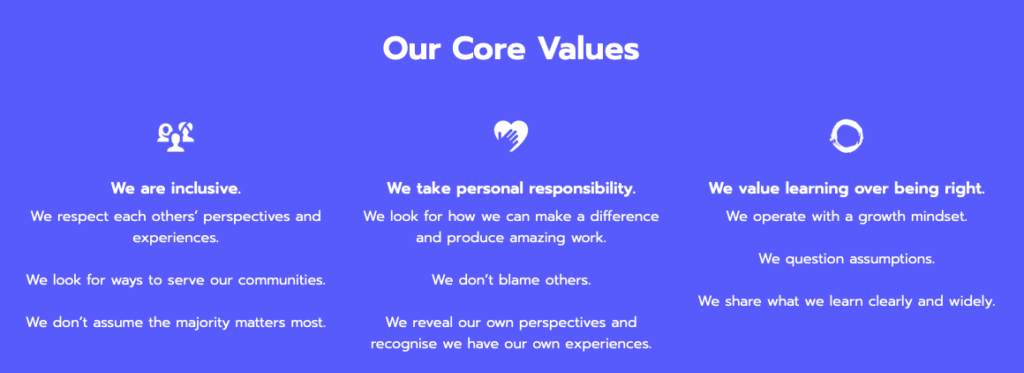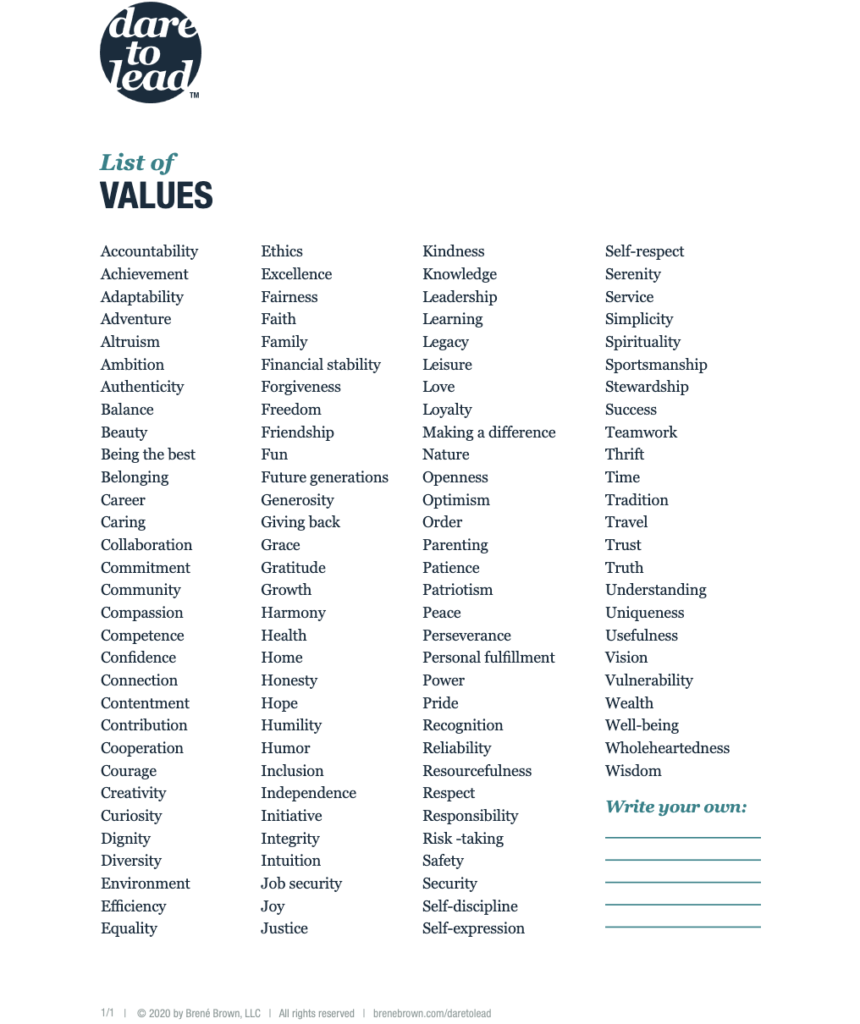I had an aha! moment a few months ago when listening to a book on startups that described how many companies create lists of values so long and generic that they become essentially meaningless. Your core values should not be “stuff we think is good” but instead should be the specific qualities your company embodies more than 95% of other organizations. These values should reflect the founders, the team, the product, and the customers. They should be one of your litmus tests for making collective decisions.
The companies I’ve worked for have been led by people who cared about values, but those values were not honed down in this way, and there was some cognitive dissonance as a result.
For GetWith, I created a Three Core Values matrix, which reflects what I’m about and what I want to build with others.

This week I’ve been tasked by my coach to tackle the Brené Brown exercise from Dare to Lead to narrow your personal values down to two and then write about what they mean to you and how you put them into practice. Challenge accepted!
Brown gives these instructions:
I know this is tough, because almost everyone we’ve done this work with (including me) wants to pick somewhere between ten and fifteen. I can soften the blow by suggesting that you start by circling those fifteen. But you can’t stop until you’re down to two core values.
Brené Brown
Here’s the whole list– I will be curious about which ones resonate with you:

The first one was easy. Curiosity is my core motivation, and the practice that feels most rewarding. Curiosity leads me to learn, to examine my own motives, to be able to wonder about the world and other people. It leads me to look for unusual solutions when the common ones feel ineffective.
Curiosity feels amazing, too. When I am curious, I am not in fear, not in judgement, not in suffering. It’s got a natural level of detachment to it and simultaneously leads to listening and compassion.
Curiosity has a downside, I guess, in that there’s a certain insatiability to it. It can lead me to go deep and also to go on meandering paths.
The upside to this downside is that it’s only a problem when around people who aren’t also curious, for the most part. At one point, I thought curiosity was a problem because it led to a lack of focus, but now I see that everything is connected somehow, and productivity can be a result of curiosity as much as a casualty.
I had to ponder my second choice carefully. There are many values that feel wrapped together for me. Where I land, perhaps unsurprisingly in retrospect, is on “belonging.”
Belonging ties into nearly everything I think about and care about. For one thing, I can easily look back on many of the paths I’ve chosen or interests I’ve pursued and see how belonging was a factor. I’ve sought belonging, rejected it, and offered it. I found ways to not belong and created and contributed to communities where I got to experience how distinct and perhaps even opposite meanings of belonging and fitting in.
Belonging feels like my core value, but it doesn’t mean I always feel like I belong in every context. It does mean that I locate belonging in myself and question systems or contexts that exclude people based on factors that don’t have anything to do with connection or mutual resonance among individuals. It means I deeply appreciate systems that promote mattering, interconnection, and caring, which are the bedrocks upon which belonging rests.
In more recent times, I’ve been learning about what facilitates belonging and choosing to belong more actively. I’ve been on a quest to find ways for technology to support the process and practice of belonging and seeking to support the stewards of the spaces where I notice it emerging.
Belonging does have a dark side, but it’s a result of it being half-practiced or using only the instinctive aspects of belonging that rest on us-them dynamics. People feel like they belong because they are not “othered,” and our limbic systems actually run on implicit biases all the time.
As soon as you start going deep into belonging using other parts of your intelligence, it’s clear that the way to have the deepest sense of belonging is by welcoming. There are interesting subtleties to explore, especially because trust and belonging are so intertwined, and for the most part the collective technology we have now doesn’t respect the constraints of systemic trust, which has natural numerical boundaries.
What does it look like to fully live these values? I don’t know, but my guess is that there are a lot of self-defeating behaviours that can’t co-exist with these particular two, and that is fun to think about. Oops, self-judgement isn’t going to work in that system! But honestly seeing where things aren’t working and growth and change? You betcha.
Now I’m super curious where all my closest compatriots land on this exercise. Do tell.
